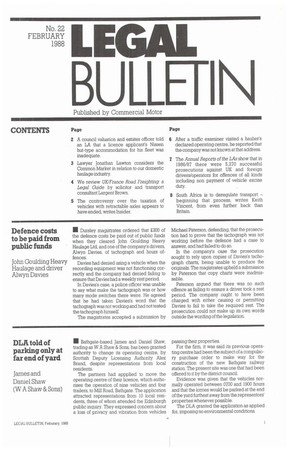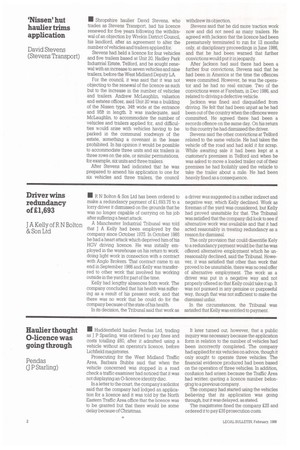LEGAL
Page 3

Page 4

If you've noticed an error in this article please click here to report it so we can fix it.
BULLETIN
2 A council valuation and estates officer told an LA that a licence applicant's Nissen hut-type accommodation for his fleet was inadequate.
3 Lawyer Jonathan Lawton considers the Common Market in relation to our domestic haulage industry.
4 We review UK/France Road Freighting. a Legal Guide by solicitor and transport consultant Largent Brown.
5 The controversy over the taxation of vehicles with retractable axles appears to have ended, writes Insider.
• Dursley magistrates ordered that £300 of the defence costs be paid out of public funds when they cleared John Goulding Heavy Haulage Ltd, and one of the company's drivers, Alwyn Davies, of tachograph and hours offences, Davies had denied using a vehicle when the recording equipment was not functioning correctly and the company had denied failing to ensure that Davies had a weekly rest period.
In Davies's case, a police officer was unable to say what make the tachograph was or how many mode switches there were. He agreed that he had taken Davies's word that the tachograph was not working and had not tested the tachograph himself.
The magistrates accepted a submission by • Bathgate-based James and Daniel Shaw, trading as WA Shaw & Sons, has been granted authority to change its operating centre, by Scottish Deputy Licensing Authority Alex Brand, despite representations from local residents.
The partners had appplied to move the operating centre of their licence, which authorises the operation of nine vehicles and four trailers, to Mill Road, Bathgate. The application attracted representations from 10 local residents, three of whom attended the Edinburgh public inquiry. They expressed concern about a loss of privacy and vibration from vehicles 6 After a traffic examiner visited a haulier's declared operating centre, he reported that the company was not known at that address.
7 The Annual Reports of the LAs show that in 1986/87 there were 5,270 successful prosecutions against UK and foreign drivers/operators for offences of all kinds including non payment of vehicle excise duty.
8 South Africa is to deregulate transport beginning that process, writes Keith Vincent, from even further back than Britain.
Michael Paterson, defending, that the prosecution had to prove that the tachograph was not working before the defence had a case to answer, and had failed to do so.
In the company's case the prosecution sought to rely upon copies of Davies's tachograph charts, being unable to produce the originals. The magistrates upheld a submission by Paterson that copy charts were inacimissable.
Paterson argued that there was no such offence as failing to ensure a driver took a rest period. The company ought to have been charged with either causing or permitting Davies to fail to take the required rest. The prosecution could not make up its own words outside the wording of the legislation.
For the firm, it was said its previous operating centre had been the subject of a compulsory purchase order to make way for the construction of the new Bathgate railway station The present site was one that had been offered to it by the district council.
Evidence was given that the vehicles normally operated between 0700 and 1900 hours and that the lorries would be parked at the end of the yard furthest away from the representors' properties whenever possible.
The DLA granted the application as applied for, imposing no environmental conditions. II Shropshire haulier David Stevens, who trades as Stevens Transport, had his licence renewed for five years following the withdrawal of an objection by Wrekin District Council, his landlord, after an agreement to alter the number of vehicles and trailers applied for.
Stevens had held a licence for four vehicles and five trailers based at Unit 20, Hadley Park Industrial Estate, Telford, and he sought renewal with an increase to seven vehicles and nine trailers, before the West Midland Deputy LA.
For the council, it was said that it was not objecting to the renewal of the licence as such but to the increase in the number of vehicles and trailers. Andrew McLaughlin, valuation and estates officer, said Unit 20 was a building of the Nissen type, 34ft wide at the entrance and 95ft in length. It was inadequate, said McLaughlin, to accommodate the number of vehicles and trailers applied for, and difficulties would arise with vehicles having to be parked in the communal roadways of the estate, something a covenant in the lease prohibited. In his opinion it would be possible to accommodate three units and six trailers in three rows on the site, or similar permutations, for example, six units and three trailers.
After Stevens had indicated that he was prepared to amend his application to one for six vehicles and three trailers, the council • R N Bolton & Son Ltd has been ordered to make a redundancy payment of £1,693.75 to a lorry driver it dismissed on the grounds that he was no longer capable of carrying on his job after suffering a heart attack.
A Manchester Industrial Tribunal was told that J A Kelly had been employed by the company since October 1975. In October 1985 he had a heart attack which deprived him of his HGV driving licence. He was initially employed in the warehouse on his return to work, doing light work in connection with a contract with Anglo Brokers. That contract came to an end in September 1986 and Kelly was transferred to other work that involved his working outside in the yard for part of the time.
Kelly had lengthy absences from work. The company concluded that his health was suffering as a result of his present work, and that there was no work that he could do for the company because of the state of his health.
In its decision, the Tribunal said that work as
E Huddersfield haulier Pendas Ltd, trading as J P Sparling, was ordered to pay fines and costs totalling £60, after it admitted using a vehicle without an operator's licence, before Lichfield magistrates.
Prosecuting for the West Midland Traffic Area, Barbara Stubbs said that when the vehicle concerned was stopped in a road check a traffic examiner had noticed that it was not displaying an 0-licence identity disc.
In a letter to the court, the company's solicitor said that the company had lodged an application for a licence and it was told by the North Eastern Traffic Area office that the licence was to be granted but that there would be some delay because of Christmas. Stevens said that he did more traction work now and did not need as many trailers. He agreed with Jackson that the licence had been prematurely terminated to run for 12 months only, at disciplinary proceedings in June 1986, and that he had been warned that further convictions would put it in jeopardy.
After Jackson had said there had been a further four convictions, Stevens said that he had been in America at the time the offences were committed. However, he was the operator and he had no real excuse. Two of the convictions were at Fareham, in Dec 1986, and related to driving a defective vehicle.
Jackson was fined and disqualified from driving. He felt that had been unjust as he had been out of the country when the offences were committed. He agreed there had been a records offence on the same day. On his return to this country he had dismissed the driver.
Stevens said the other convictions at Telford related to the same vehicle. He had taken the vehicle off the road and had sold it for scrap. While awaiting sale it had been kept at a customer's premises in Telford and when he was asked to move a loaded trailer out of their premises he had foolishly used the vehicle to take the trailer about a mile. He had been heavily fined as a consequence.
a driver was suggested in a rather indirect and negative way, which Kelly declined. Work as foreman of the yard was considered, but Kelly had proved unsuitable for that. The Tribunal was satisfied that the company did look to see if alternative work was available and that it had acted reasonably in treating redundancy as a reason for dismissal.
The only provision that could clisentitle Kely to a redundancy payment would be that he was offered alternative employment which he unreasonably declined, said the Tribunal. However, it was satisfied that other than work that proved to be unsuitable, there was no real offer of alternative employment. The work as a driver was put in a negative way and not properly offered so that Kelly could take it up. It was not pursued in any genuine or purposeful way, though that was not sufficient to make the dismissal unfair.
In the circumstances, the Tribunal was satisifed that Kelly was entitled to payment.
It later turned out, however, that a public inquiry was necessary because the application form in relation to the number of vehicles had been incorrectly completed. The company had applied for six vehicles on advice, though it only sought to operate three vehicles. The financial evidence produced had been based on the operation of three vehicles. In addition, confusion had arisen because the Traffic Area had written quoting a licence number belonging to a previous company.
The company had started using the vehicles believing that its application was going through, but it was delayed, as stated.
The magistrates fined the company £25 and ordered it to pay £35 prosecution costs.




































































































